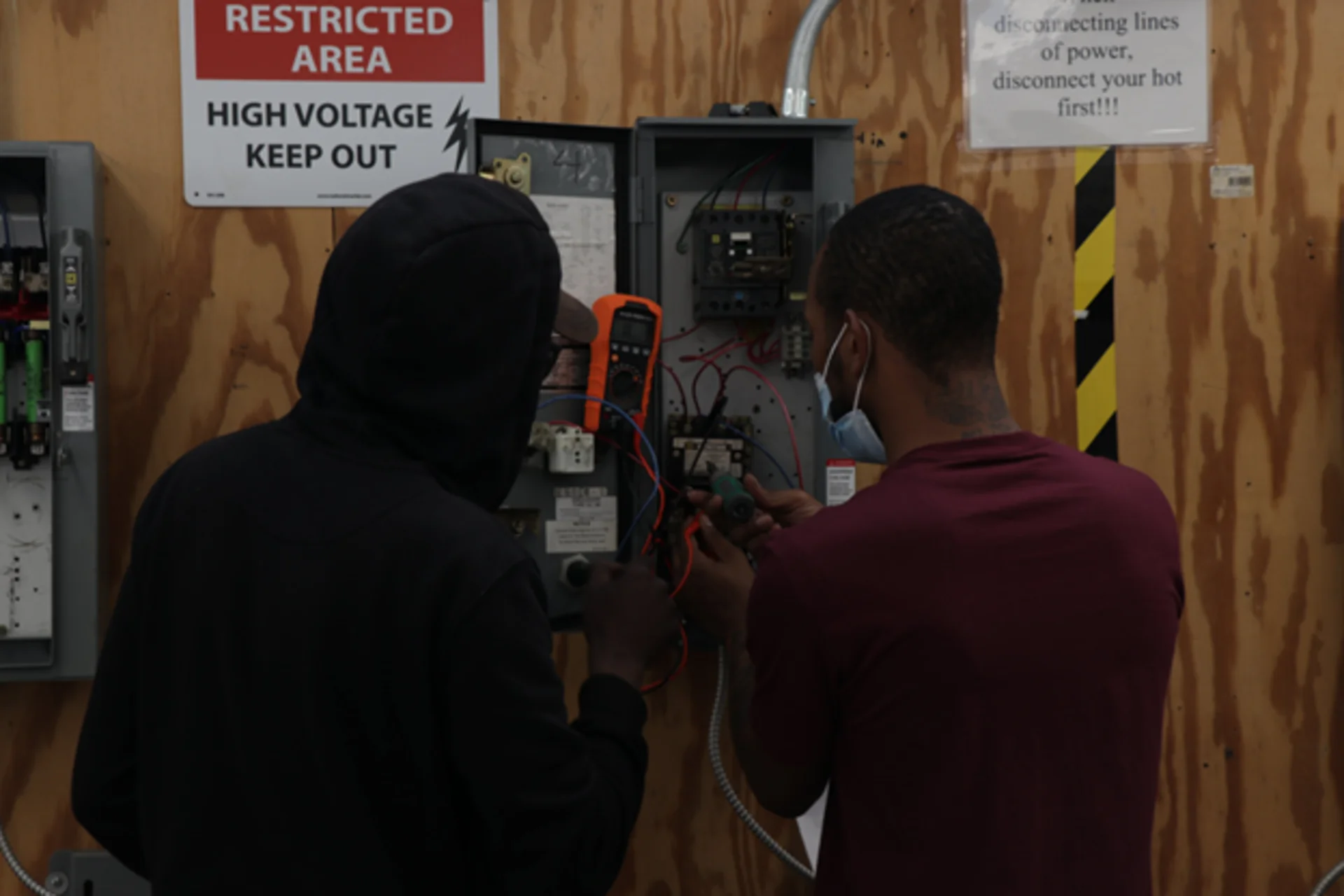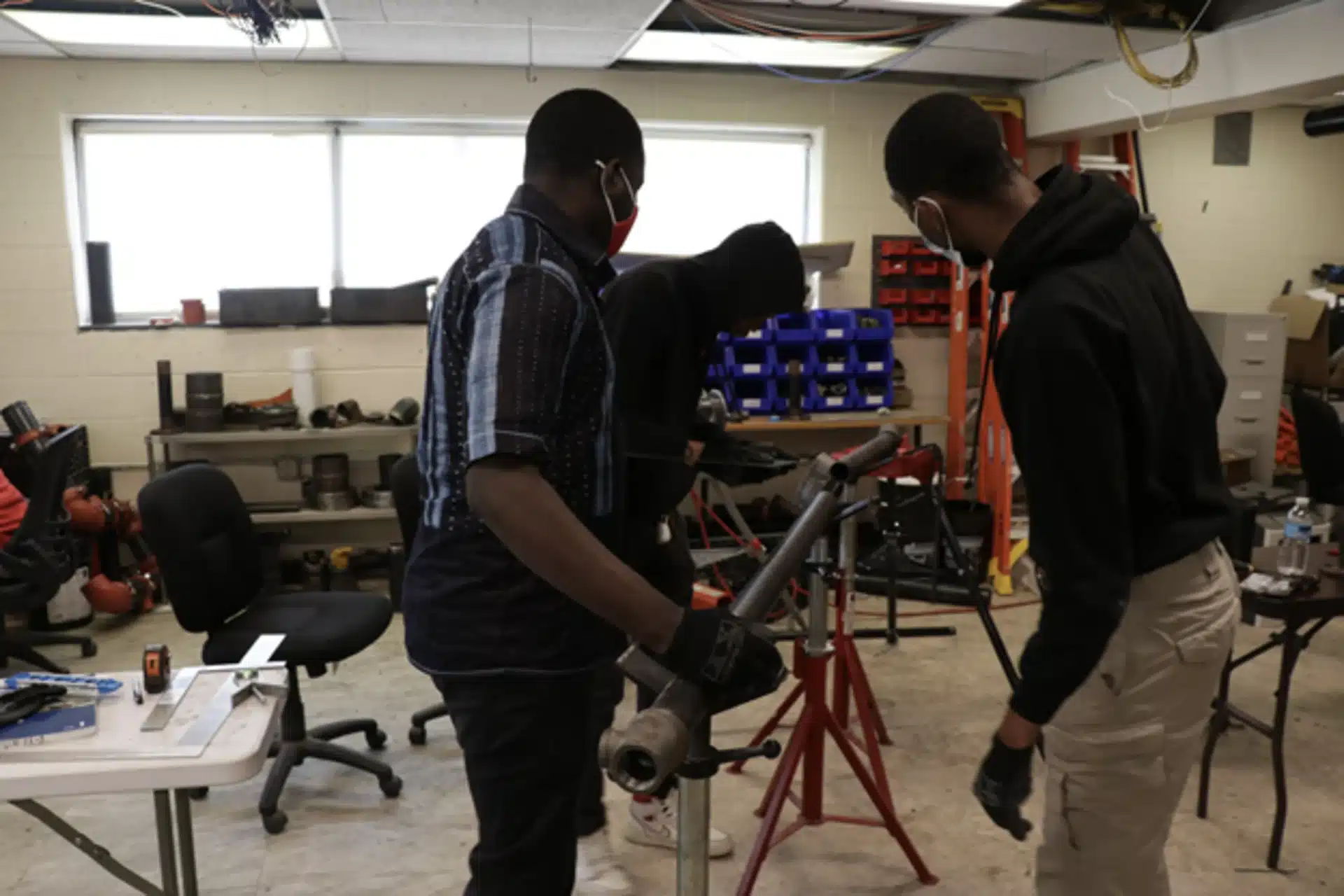Introduction: From Frustration to Fulfilment
You sit in a classroom. Another PowerPoint. Another lecture. The words blur. The diagrams vanish the moment you step outside.
Sound familiar?
For so many adults in vocational training, this isn’t just learning—it’s déjà vu. Hours of theory. No real-world connection. And yet, you’re promised “career-ready skills.”
Meanwhile, life doesn’t slow down. Bills. Kids. Long shifts. Every hour matters. So when training feels like wasted time, frustration builds. You don’t need facts you’ll forget—you need skills that stick.
That’s why hands-on trade training in Philadelphia changes everything. No endless slides. No empty promises. Just real tools. Real projects. Real mastery. The science backs it. But the transformation? That you can feel.

A diverse group of skilled trade students in Philadelphia works together on hands-on vocational training projects. The collaborative environment fosters teamwork, problem-solving, and practical learning as students prepare for vocational certification programs and real-world trade careers.
Many come to Philadelphia hands-on vocational training for adults with the same story. A training course. A promise of job-ready skills. And then? Lecture after lecture.
You pass the test. But can you actually wire a panel? Fix a motor? Install a plumbing system that works the first time?
This gap between knowledge and confidence is what vocational colleges want to close. That’s why vocational training programs across Philadelphia now replace “all talk, no action” with real-world doing. Because skills are learned by doing? They stay.
Here’s the secret: the brain loves action.
Every time students handle a tool, weld a joint, or test a circuit, they activate multiple senses. Seeing. Touching. Moving. Solving. Neuroscientists call this multi-sensory learning.
That’s why hands-on trade training in Philadelphia works so well. Instead of fading like crammed notes, the skills become part of you. Muscle memory takes over. The brain stores not only information but also the emotional experience of the task.
This is important for working individuals balancing work and family responsibilities. Knowledge that fades away once they graduate is too expensive for them. Lifelong skill sets are necessary for them.
Programs that rely heavily on lectures make development seem unnoticeable. You put in the time to study. You evaluate. Your grades are on the way. Weeks go by.
But in vocational certification programs, success comes alive in real time. A working motor. A perfect weld. A leak-free pipe.
Each win builds confidence. And confidence? It’s addictive. Suddenly, students aren’t just chasing a certification. They’re proving to themselves—I can do this.
That belief keeps them coming back after long shifts. After long commutes. Through tired nights.
Mistakes are viewed as failures in conventional classes.
A wrong answer? Too late. Move on.
But in Philadelphia, hands-on vocational training for adults, mistakes become the best teachers.
A pipe cut wrong. A wire connected poorly. A motor that sputters. Each one forces you to pause. Think. Try again.
That trial-and-error loop changes everything. Students don’t just memorize steps. They learn how to solve problems. Employers value that far more than perfect test scores.
Another reason lectures fall short? They give you terms without tasks.
You read about climate control systems. But have you ever fixed one?
That’s why vocational colleges in Philadelphia bring the real world into training. Wiring systems in local homes. Actual equipment used on job sites. Plumbing layouts from Philly buildings.
So when graduates step into their first jobs, nothing feels new. They’ve already been there—in training. No frozen panic. Just confident action.

Traditional training can feel lonely. Lectures. Solo study. Silent tests.
But hands-on trade training in Philadelphia builds teams. Students learn side by side. They swap tips. Cheer each other on. Solve problems together.
And that shared experience matters. It turns classmates into a network of support—a community facing the same late nights, the same second chances, the same big goals.
The strongest vocational certification programs don’t just hand you a wrench and say, “Good luck.” Based on known psychological principles, they construct learning experiences:
It’s training that turns frustration into progress—and progress into paychecks.
Let’s be honest. Most adults in vocational training aren’t here for fun.
They need jobs. Careers. Bigger paychecks. A second chance.
That’s why Philadelphia’s hands-on vocational training for adults respects their time. It delivers skills they can use immediately. Not pages of theory they’ll forget before graduation.
Success brings an ever-increasing tide. Every endeavor that is completed helps to cultivate a sense of achievement. Soon enough, they will be considered more than just students. They’re professionals.
The hands-on trade training in Philadelphia is rewriting what learning looks like for adults.
No more passive lectures. No more wasted time. Just real tools. Real projects. Real confidence.
What begins as one class often becomes a turning point. A moment when students see a future they can actually touch.
That’s learning that lasts—not just for a job, but for life.
Read more: